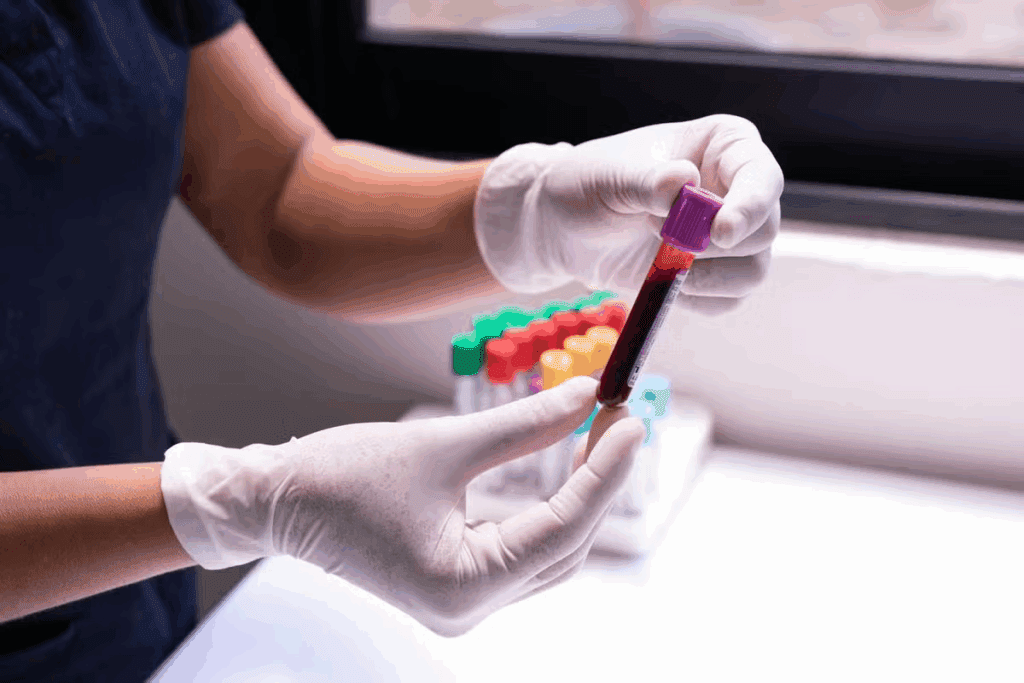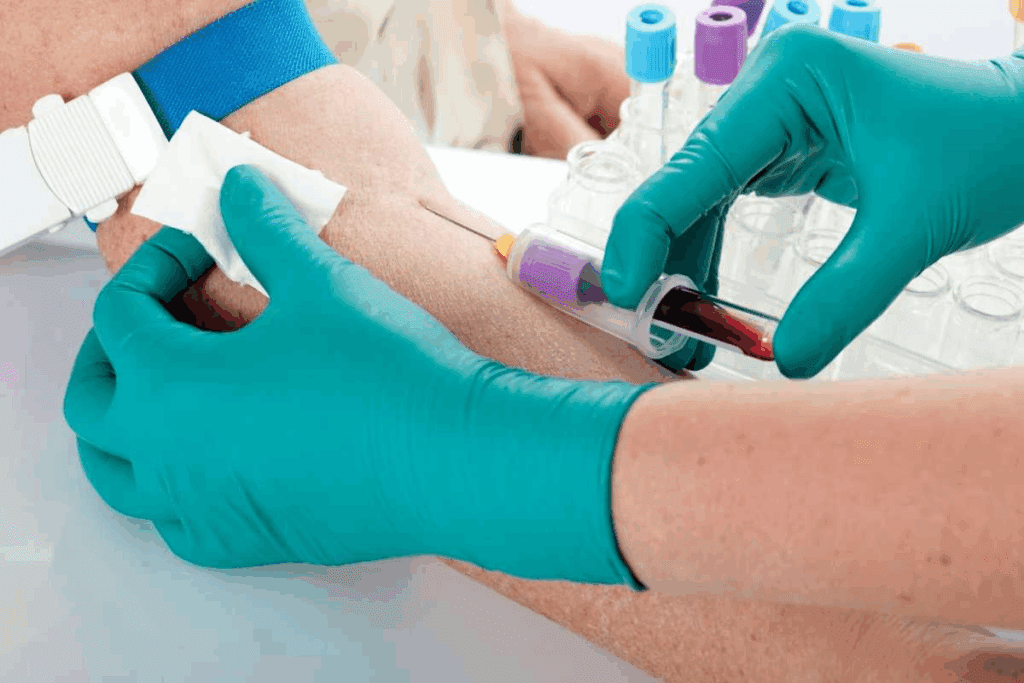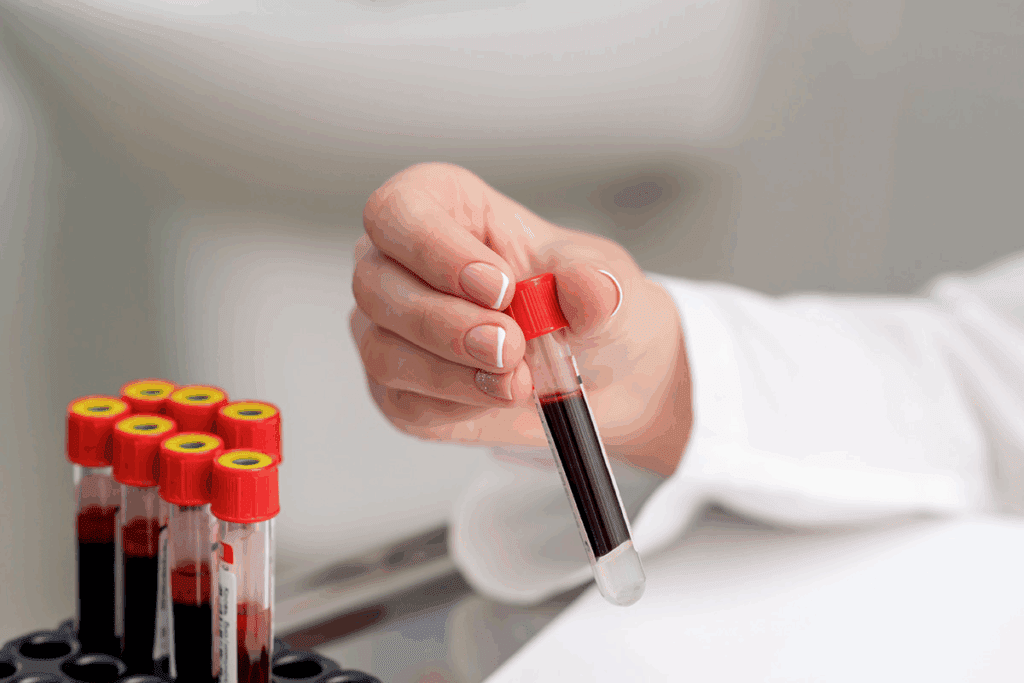Last Updated on October 21, 2025 by mcelik

Cancer diagnosis has become more advanced with new tools. A significant number of cancer cases are detected through blood work. This shows how important it is to understand blood test findings.
Not all cancers can be found through a full blood test. But many types can be detected. This makes it a key tool for diagnosis. The different types of blood tests play a big role in finding cancer.
The link between cancer and blood tests is complex. It involves changes in the blood that can show if someone has cancer. Cancer cells can change blood in many ways, making blood tests key for finding and tracking the disease.
Cancer can change the blood in different ways. For example, it can make more or fewer of certain blood cells. A Complete Blood Count (CBC) can spot these changes, helping in cancer screening.
Cancer cells also release proteins or markers into the blood. These can help doctors diagnose cancer. While not sure on their own, they suggest cancer might be present and lead to more tests.
There are many blood tests for cancer screening:
These tests are often used together to get a full picture of a patient’s health. They help decide what tests to do next.
Discovering cancer through lab tests starts with a blood sample. This sample is then tested in a lab with various tests.
Doctors look at the test results for signs of cancer. If they find something odd, they might suggest more tests, like scans or biopsies, to confirm cancer.
Spotting cancer early with blood tests can greatly improve treatment chances. This shows how vital these tests are in cancer screening.

Blood tests are key in finding cancer early. They look for biomarkers and signs of the disease. These tests help doctors catch cancer early and keep an eye on it.
A Complete Blood Count (CBC) checks the blood’s parts, like red and white cells and platelets. If these parts are off, it might mean cancer. For example, too many white cells could point to leukemia or lymphoma.
Key CBC Abnormalities That May Indicate Cancer:
Protein changes in the blood can hint at can,ce,r too. Some proteins, called tumor markers, are made by cancer cells. For instance, high PSA levels can mean prostate cancer.
| Tumor Marker | Associated Cancer |
| Prostate-Specific Antigen (PSA) | Prostate Cancer |
| Carcinoembryonic Antigen (CEA) | Colorectal Cancer |
| CA 125 | Ovarian Cancer |
A full blood test, with CBC and other markers, gives a detailed health picture. It might show signs of cancer. Though not sure on its own, it’s a big help in finding and watching cancer.
Butt, odd blood test results don’t always mean cancer. More tests are needed to be sure.

Certain tumor markers in the blood can hint at specific cancers. These markers are made by both healthy and cancer cells, but cancer cells make more. Knowing about tumor markers is key to spotting and tracking cancer.
Tumor markers are proteins, enzymes, or hormones found in higher amounts in cancer patients. They can be found in blood, urine, or tissues. There are many types, like enzymes, hormones, and oncofetal antigens. For example, prostate-specific antigen (PSA) is linked to prostate cancer, and carcinoembryonic antigen (CEA) is tied to colorectal cancer.
Many tumor markers are used to diagnose and manage cancer. Here’s a list of some common ones and the cancers they’re linked to:
These markers are important for early detection and tracking cancer. But ot all cancers have specific markers, and some markers can be high in non-cancerous conditions too.
CA19-9 is often linked to pancreatic cancer. High levels of CA19-9 might mean pancreatic cancer, but it can also be high in other issues like pancreatitis. Other specific markers include:
| Tumor Marker | Associated Cancer |
| CA 15-3 | Breast Cancer |
| CA 27.29 | Breast Cancer |
| hCG | Choriocarcinoma, Germ Cell Tumors |
Tumor marker tests are useful but have limits. These include:
So, these tests are best used with other diagnostic tools and clinical assessments for a full picture of a patient’s health.
Understanding blood test results is vital for early cancer detection. Blood tests are a key tool for spotting cancer. They look for markers and blood abnormalities that suggest cancer.
A positive test doesn’t always mean you have cancer. It means you need more tests. Positive results show blood count issues or tumor markers for certain cancers.
An elevated white blood cell count might point to leukemia or lymphoma. Certain proteins, like prostate-specific antigen (PSA), suggest prostate cancer.
Abnormal blood work isn’t just about cancer. It can also show infections, inflammatory diseases, or benign tumors. It’s important to understand the context of abnormal results for a correct diagnosis.
An abnormal complete blood count (CBC) might mean anemia, infection, or leukemia. Each condition needs a different approach for diagnosis and treatment.
Not every abnormal test needs quick action. But some patterns or combinations might need more tests. Doctors look at several factors, like your medical history and symptoms, to decide what to do next.
More tests might include X-rays, CT scans, or MRIs. Sometimes, a biopsy is needed to confirm cancer. The goal is to be thorough and accurate in diagnosis.
Blood tests are key in finding cancers early. They help spot abnormal cell counts or tumor markers. This early detection is vital because it means treatments can work better.
Leukemia is a blood and bone marrow cancer. A Complete Blood Count (CBC) test can show early signs. It checks the blood’s white, red cells, and platelets.
Abnormal white blood cell counts hint at leukemia. Other signs include anemia, low platelet count, and blast cells in the blood.
Multiple myeloma affects plasma cells in the bone marrow. Blood smears can show signs of this cancer, like rouleaux formation of red blood cells.
A blood smear test looks at blood under a microscope. In multiple myeloma, it might show plasma cells or other changes.
| Blood Test | Normal Result | Multiple Myeloma Indication |
| Blood Smear | Normal cell morphology | Rouleaux formation, plasma cells |
| Protein Electrophoresis | Normal protein levels | M-protein presence |
Pancreatic cancer is often caught late. But blood tests can help find it early. The CA 19-9 tumor marker is used to track this cancer.
High CA 19-9 levels might mean pancreatic cancer. But this marker can also be high in other conditions.
Other cancers can also be detected with blood tests. For example, prostate-specific antigen (PSA) helps find prostate cancer. CA-125 is used for ovarian cancer.
These markers aren’t the only way to diagnose cancer. They’re used with other tests to track cancer or see how well treatments are working.
Blood tests are great for finding many cancers. But some cancers are hard to spot with blood tests. This is true for solid tumors.
Brain cancer is tricky to find with blood tests. The blood-brain barrier blocks cancer markers from getting into the blood. This makes it hard to detect brain cancer through blood work alone.
Cervical cancer is also hard to find with blood tests. There are blood tests for cervical cancer biomarkers. But these tests are not the first choice for diagnosis. Instead, doctors use Pap smears and HPV tests.
Bowel cancer might show up in blood tests, like through carcinoembryonic antigen (CEA). But CEA tests are not for diagnosing at first. They help check if treatment is working or if cancer comes back.
Solid tumors, like brain, cervical, and bowel cancer, are hard to find with blood tests. Unlike liquid tumors, solid tumors don’t release biomarkers into the blood until they’re big. This makes early detection tough.
| Cancer Type | Blood Test Detection Challenges | Primary Diagnostic Methods |
| Brain Cancer | Blood-brain barrier limits biomarker release | Imaging (MRI, CT scans) |
| Cervical Cancer | Limited biomarker presence in blood | Pap smears, HPV testing |
| Bowel Cancer | Biomarkers like CEA are not always elevated early | Colonoscopy, stool tests |
It’s key to know what blood tests can and can’t do for cancer detection. Blood tests are useful, but need to be used with other tests for an accurate diagnosis.
New blood testing technologies are changing how we find and treat cancer. These advancements bring hope for early diagnosis and better treatment options. They are making a big difference in how we fight cancer.
CTC testing finds cancer cells in the blood. It tells us if cancer is present and if it’s spreading. This test is great for tracking how cancer grows and how well treatments work.
Key benefits of CTC testing include:
The Galleri cancer test can spot over 50 types of cancer from one blood sample. It looks for DNA signs of cancer in the blood. This could save lives by catching cancer early.
The Galleri test is a big step forward in cancer screening. It can find many cancer types with just a blood test.
Liquid biopsy is a way to check for cancer without invasive tests. It looks at DNA in the blood for cancer signs. This method is getting better at finding cancer early and accurately.
Liquid biopsy has many benefits, including:
Companies like CellMax Life are leading in liquid biopsy tests for cancer. They use new tech to make cancer screening more accurate.
Innovative testing companies are key to improving cancer detection. They offer hope for patients and doctors.
Getting a blood test for cancer screening is easy. You need to prepare and know what to expect. This includes several steps, from asking for blood work to understanding the results.
If you’re worried about cancer, start by talking to your doctor. They will check your risk and decide if a blood test is right for you. Talk about your family history, any symptoms, and health info to help them decide.
Your doctor might order specific tests based on your risk and health history. This could include tests for tumor markers or other cancer-specific tests.
Some cancer tests need you to fast, while others don’t. Fasting means not eating or drinking for a few hours before the test. Your doctor will tell you if you need to fast and for how long.
A healthcare professional will clean your elbow for the blood draw. They will use a needle to take blood into tubes. The whole process is usually quick and doesn’t hurt much.
How long it takes to get your results varies. Some tests give results in hours, while others take days. Your doctor will tell you when to expect your results and how they’ll share them with you.
Knowing what to expect can make you feel less anxious. It helps you prepare for what comes next, like more tests, talking about results, or starting treatment if cancer is found.
Knowing when to get blood tests for cancer is key to early detection and treatment. Blood tests can show if cancer is present. Knowing when to get tested can greatly affect the outcome.
Some risk factors mean you might need blood tests for cancer. These include family history of cancer, genetic predispositions, and exposure to harmful substances. For example, people with a family history of breast or ovarian cancer might need regular blood tests.
Key risk factors to consider:
It’s important to know the symptoms that might mean cancer. These symptoms can have many causes, but if they last or are severe, see a doctor. Common signs include unexplained weight loss, feeling very tired, and changes in skin or bowel habits.
Notable symptoms that may prompt blood work:
Talking to your healthcare provider about cancer screening is important. They can look at your risk factors, suggest tests, and tell you how often to get tested.
After deciding to get blood tests, finding a place to do them is next. Ask your healthcare provider for suggestions or search online for certified labs near you.
Tips for finding testing locations:
Blood tests are key in managing cancer. They help check if treatments are working and if cancer might come back. This info helps doctors make better care plans.
Blood tests are essential for seeing how well cancer treatment is working. Doctors look at different markers in the blood to see if the treatment is effective. If not, they can change the treatment plan.
Tumor markers are proteins found in the blood of some cancer patients. Watching these markers can show if treatment is effective.
After treatment, blood tests are key in watching for cancer to come back. Regular tests can spot changes in tumor markers or other signs of cancer.
| Cancer Type | Tumor Marker | Purpose of Monitoring |
| Ovarian Cancer | CA-125 | Detect recurrence, monitor treatment response |
| Colorectal Cancer | CEA | Monitor for recurrence, assess treatment efficacy |
| Prostate Cancer | PSA | Detect recurrence, monitor treatment response |
During remission, blood tests keep an eye on the patient’s health. They can spot early signs of cancer coming back or other health problems.
Donating plasma is not usually advised for cancer patients. It could risk the health of the person getting the plasma. The rules depend on the cancer type, treatment, and other health factors.
The world of cancer diagnosis is on the verge of a big change. This is thanks to new blood testing technologies. As scientists find new ways to spot cancer early and accurately, we’re on the brink of major breakthroughs.
Several new technologies are being looked into for better cancer blood tests. These include:
These technologies are leading the way in cancer research. They promise more accurate and earlier detection.
The chance for big strides in early cancer detection is huge. With ongoing research and development, we can look forward to:
As these technologies keep improving, they could change cancer diagnosis forever. They might help us find and treat cancer more effectively.
Blood tests are key in finding cancer, giving us important clues about a patient’s health. It’s vital to understand how cancer and blood tests are connected. This helps in making the right diagnosis and treatment.
Even though blood tests can spot some cancers, like leukemia and lymphoma, they’re not perfect. Not every cancer shows up in blood tests. Sometimes, more tests like scans or biopsies are needed to confirm a diagnosis.
This shows we need a complete plan for finding cancer. Using blood tests along with other tools and looking at each person’s risk can help. This way, doctors can find and treat cancer better.
New research and technologies in blood testing are on the horizon. Keeping up with these advancements can help both patients and doctors. It ensures we’re using the best methods for cancer screening and treatment.
No, not all cancers can be found through blood tests. Some cancers, like leukemia, can be detected. But cancers in places like the brain or bowel might not show up in blood tests.
Tumor markers are substances found in the blood of some cancer patients. They can mean cancer is present. But they can also appear in non-cancerous conditions.
The time to get blood test results varies. It depends on the test and the lab. Usually, results come in a few days. But some tests, like the Galleri cancer test, might take longer.
A CBC can show signs of cancer, like anemia or abnormal white blood cells. But it’s not a sure test for cancer. More tests are needed to confirm.
The Galleri cancer test looks for DNA in the blood to find cancer. It’s a liquid biopsy that can spot cancer early.
Usually, people with cancer can’t donate plasma. It’s because of the risk of passing on cancer cells or other issues.
To get a blood test for cancer screening, talk to your doctor. They’ll check your risk and decide on the right tests.
You might need to fast or avoid certain meds before the test. Your doctor or lab will give you specific instructions.
Some tests, like the Galleri test, aim to find cancer early. But how well they work depends on the cancer type and the test.
CTCs are cancer cells in the blood. They help detect cancer, check treatment success, and track if cancer comes back.
Blood tests track how well the treatment is working. They also watch for cancer coming back and changes in cancer markers during remission.
Blood tests have limits. They can give false results or miss some cancers. They should be used with other tests and the doctor’s evaluation.
No, not all abnormal results mean cancer. Many things can cause them. More tests are needed to find the cause.
Protein changes can signal cancer. Certain proteins, like tumor markers, help find specific cancers.
Look for testing places by talking to your doctor or checking local labs. You can also search online for cancer blood testing facilities.
Subscribe to our e-newsletter to stay informed about the latest innovations in the world of health and exclusive offers!